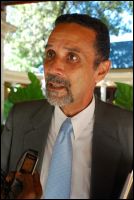Philippe Charles Claude Rouzier, 1946 - 2010
Civil Affairs Officer (Haiti)

Philippe Rouzier, a national of Haiti, was a Civil Affairs Officer for the United Nations Stabilization Mission in Haiti (MINUSTAH) since April 2009.
Philippe studied at the Université Catholique de Louvain in Belgium, graduating with a Doctorate in Economics, and began his working life as a Research Assistant in the Economics Department of the University of Michigan in Ann Arbor, United States.
He rose quickly to become a professor of economics at Université Laval in Montreal, Canada, but returned to Haiti in the early 1980s. “He thought he would be more useful in Haiti than in Quebec,” recalled a friend.
On returning to Haiti, he occupied the position of chief economist for the UN Development Programme (UNDP) for his home country, guiding UNDP’s work in this field. He was responsible for the drafting and quality of the 2006 “National Human Development Report” for Haiti, which addressed issues of poverty and vulnerability.
Before joining UNDP, Philippe lent his services for a short period to the Ministry of Planning, where he was instrumental in establishing the Centre for Technology Planning and Applied Economics (CTPEA) as a teaching and research centre. Considered by many to be an undoubted success, the Centre has remained detached from political ambition and continues to provide Haiti with top-notch economists, planners and statisticians. “Importantly, Philippe was a popular professor with his CTPEA students,” recalled a friend.
After retiring from UNDP in 2006, Philippe became a consultant for MINUSTAH, focusing on poverty reduction strategies and the compilation of quantitative indicators, following up on the work initiated by the Document de stratégie nationale pour la croissance et la réduction de la pauvreté (DSNCRP).
A distinguished économist, member of the “Association Haïtienne des économistes”, former adviser to President René Préval and member of former President Jean-Bertrand Aristide’s economic team, Philippe was the author of two books on politics and economic conditions in Haiti, Echange et développement (1981) and En deux ans comme en deux siècles (1989). In collaboration with other Haitian professionals, Philippe wrote Mandat pour changer l’histoire : des positions de principe pour une concertation (1993), as well as contributed to many UNDP reports, ranging from Haitian living conditions to industrial zones in Haiti and the question of Haitian workers in the labour market of the Dominican Republic, all aimed at improving life in Haiti.
Philippe was proud to witness the achievement of a project very dear to his heart, the creation of the “Observatoire nationale de la pauvreté et de l’exclusion sociale (ONPES),” which he led after his retirement. In the months before his death, Philippe had been working on the Millennium Development Goals which he hoped would improve the living conditions of the Haitian people.
“Philippe was an imaginative and rigorous economist who has published numerous articles and two books, a productive public servant, a dedicated professional, a co-founder, leader and great supporter of the Haitian Association of Economists, a politically engaged citizen, always motivated by the pursuit of well-being for all Haitians,” said a friend, adding, “For me, Philippe has been a much valued colleague.”
Philippe was with his wife Marilise and friends, Mireille and Georges Anglade, when the earthquake struck and
their home on the outskirts of Port-au-Prince was destroyed. A friend described how Philippe’s wife had just stepped outside the house to go to her car and within a second the house just collapsed.
He is survived by his wife Marilise Neptune, their three sons and three grandchildren.